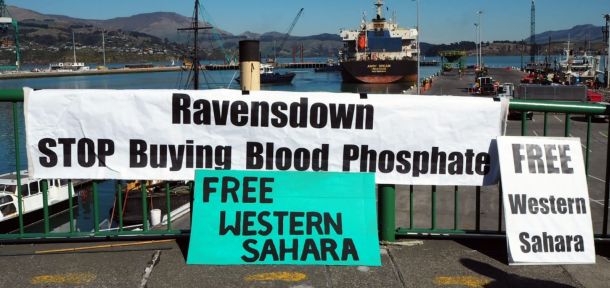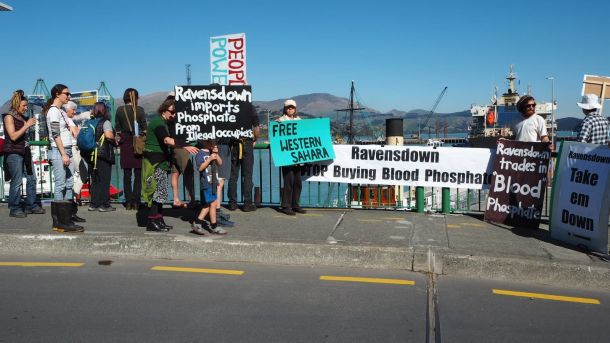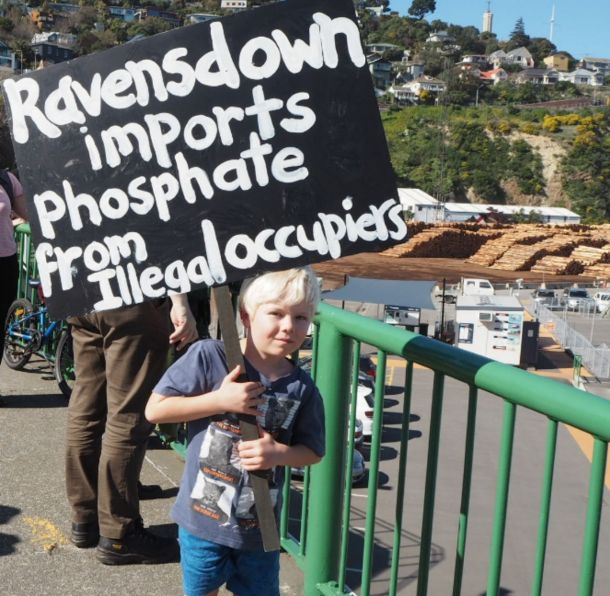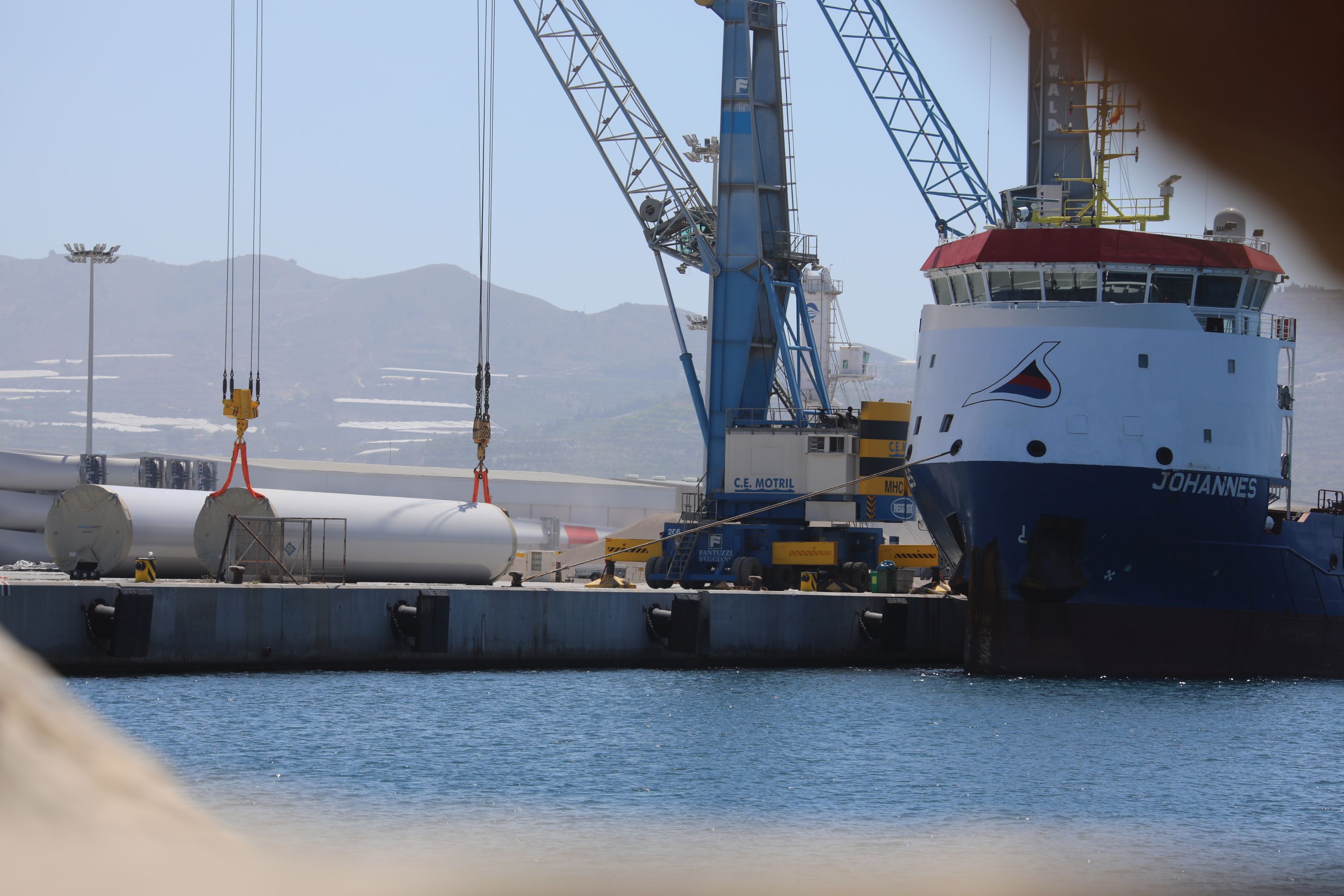
Protesters target Ravensdown over its continued purchases of illegally exploited phosphate rock from the last colony in Africa: occupied Western Sahara.
The cargo vessel Amoy Dream (Hong Kong, IMO: 9583615) was met by about 20 protesters as it arrived at the port of Lyttelton, at Christchurch in New Zealand, on 1 September 2019. Their beef? The ship’s cargo: an estimated 50,000 tons of phosphate rock from occupied Western Sahara.
The protesters called on the importer – Ravensdown Ltd, a farmer cooperative – to “stop funding blood phosphates”, their press release reads. The representative of Western Sahara's liberation movement to Australia and New Zealand, Mr. Kamal Fadel, wrote in a piece to NZ Herald that his organisation is hopeful that the prime minister of New Zealand will show "resolve to stop the phosphate trade which is damaging New Zealand's good reputation and standing in the world".
Three-quarters of Western Sahara have been brutally occupied by Morocco since 1975. The UN regards the stretch of land the size of the UK as a Non-Self-Governing Territory; a territory that is yet to achieve decolonisation. Its people, the Saharawis, have an internationally backed right to self-determination, and not a single State in the world recognises Morocco's unfounded claims to the territory.
But while Saharawis are forced to live as refugees in the inhospitable Algerian desert or suffer the yoke of the occupation in their homeland, hard-nosed economic interests eyeing the territory's natural resources have complicated conflict-resolution significantly. As Morocco reels in the profits from selling the resources of a land to which it has no claim, its incentive to genuinely engage in the UN's peace-efforts diminishes further and further. Particularly lucrative to Morocco are Western Sahara's phosphate reserves which are renowned for their high quality - a quality Ravensdown just can't seem to do without.
In 2018, Ravensdown took in a projected 215,500 tonnes of Saharawi phosphate, worth an estimated US $18.32 million. Further details about the company's involvement can be found in WSRW's P for Plunder reports - our annual overview reports documenting the trade of phosphate rock from Western Sahara during the previous calendar year. The report covering 2018 can be found here.
"I think it's an issue not a lot of Kiwis know about and I think if more Kiwis knew they'd be absolutely horrified to know that a local company was supporting this”, a protester is quoted by Radio New Zealand.
Ravensdown is one of two farmer cooperatives in New Zealand that purchase their phosphate rock from what reputable international organisations such as Human Rights Watch and Freedom House consider to be a human rights black spot. Ballance Agri-Nutrients Ltd has been involved in the contentious trade since the 1980s. In 2017, South Africa detained a cargo vessel that was transporting Western Sahara phosphate rock to Ballance. In its judgment of 23 February 2018, the High Court of South Africa confirmed that the Saharawi Republic was the owner of the entire cargo aboard of the NM Cherry Blossom, and that the ownership was never lawfully vested in OCP SA or Phosboucraa SA, who were not entitled to sell the the phospahte rock to Ballance Agri-Nutrients. Find the full ruling here.
The protest at Lyttelton port was organised by the collective Ravensdown Take Em Down Otautahi. Meanwhile, the Environmental Justice Otepoti group is planning on hosting an "unwelcome" party in the port of Dunedin, where the Amoy Dream is expected to dock tomorrow, 4 September 2019.


Greenland Yes, Western Sahara No? The EU’s self-determination test
As the European Union rightly rallies behind Greenlanders’ right to decide their own future in the face of external pressure, a test of the EU’s real commitment to self-determination is quietly unfolding in Brussels.
New report: Certified occupation
International certification standards embellish Morocco’s controversial trade with fisheries and agricultural products in occupied Western Sahara, new report documents.
Certification giant SGS points fingers elsewhere
SGS blames everyone else for mistakes on MarinTrust certificates it had issued to Moroccan companies in occupied Western Sahara.
New report: Greenwashing Occupation
Out now: WSRW today publishes a new report outlining the massive - and deeply problematic - renewable energy projects that Morocco is developing in occupied Western Sahara.



